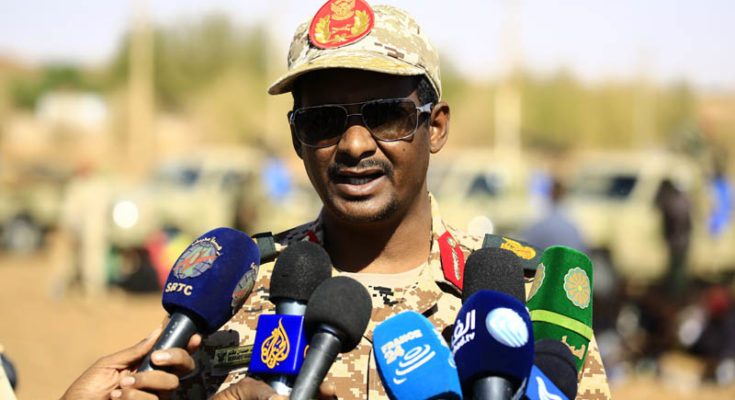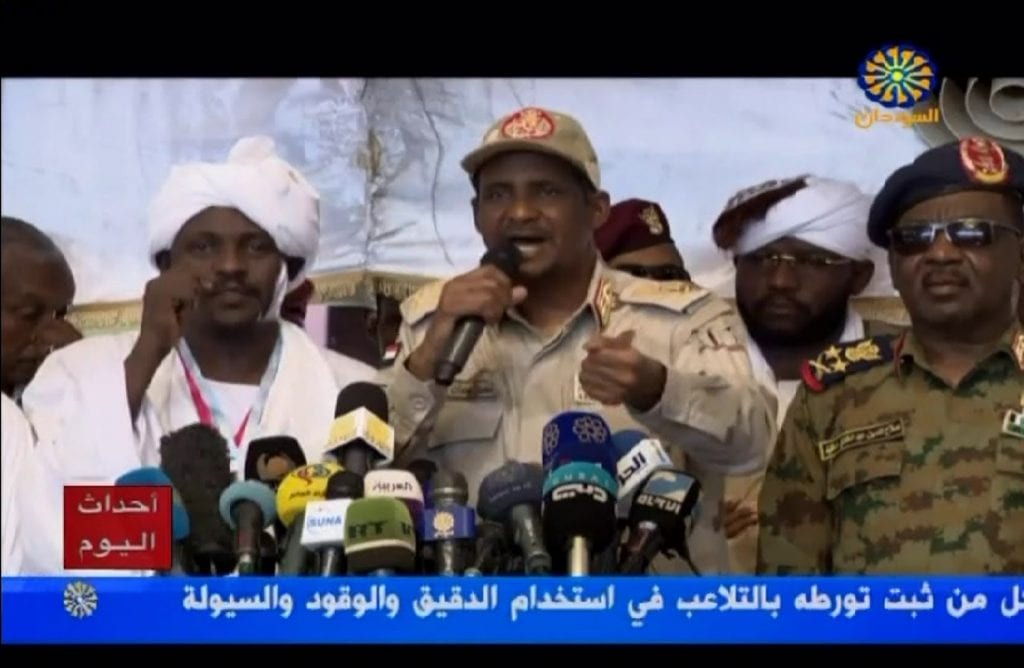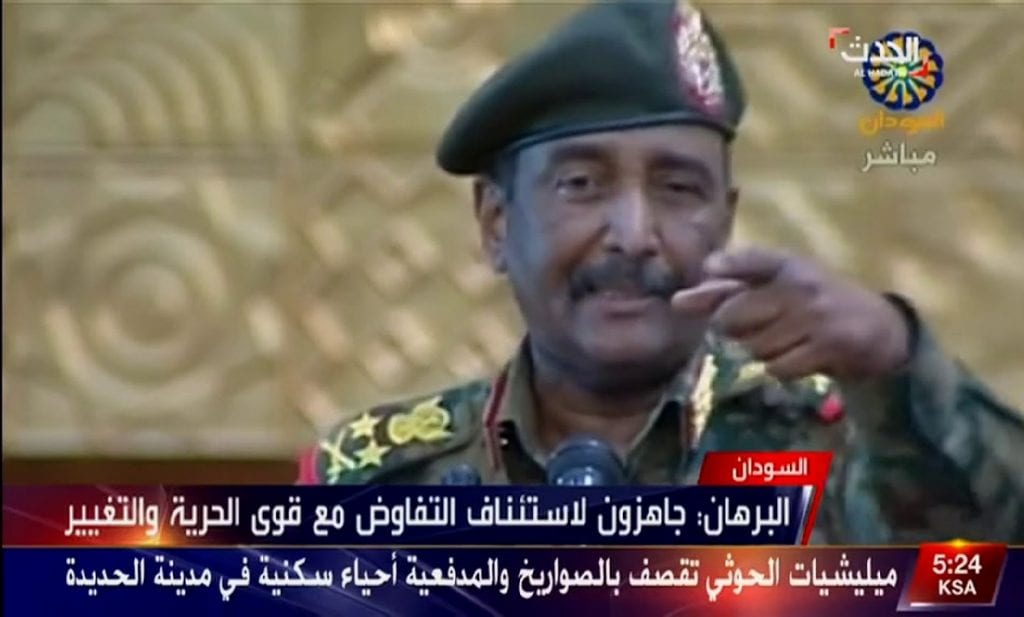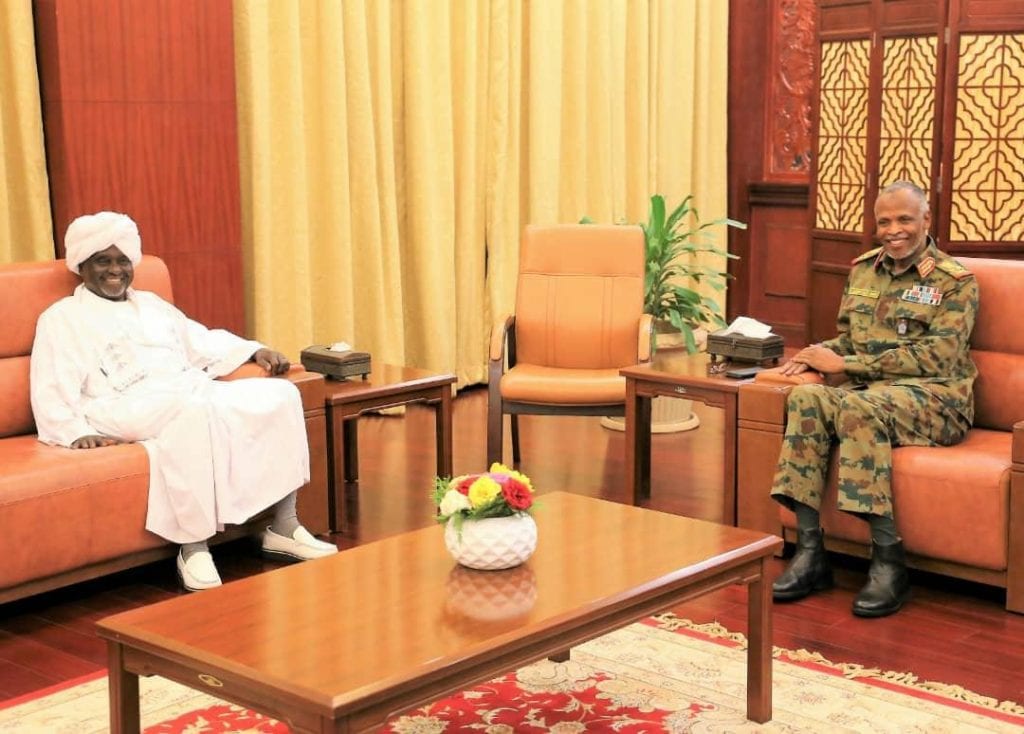Himmedti aims to setup puppet government ahead of proposed deal

While Ethiopia-led negotiations take place to set up a civilian-led transitional government, the Transitional Military Council are actively rallying up civilian support to form a technocratic government. Analysts say the Transitional Military Council (TMC) is preparing a civilian-led government relying on former ruling party supporters within the traditional leadership as an alternative to any proposed by the opposition, the Freedom and Change coalition. The Deputy Military Council leader Mohamed Hamdan Daglo (aka “Himmedti”), in particular, has repeatedly denounced in speeches an opposition-controlled legislative council that could effectively enact laws dissolving armed groups under his control.
All progress and agreements between the TMC and opposition fell apart after security forces under the TMC launched a brutal attack against protestors at the sit-in protest site on 3 June, killing an estimated 118 people and another 784 wounded, according to the Central Doctor’s Committee. Last May, the TMC and opposition agreed that the Freedom and Change coalition would appoint a temporary, three-year technocrat government that would include appointing 67% of a 300 member parliament. Himmedti has repeatedly disavowed, however, any acceptance to the opposition appointing 67% of the parliamentary seats.
Prior to the 3 June attack on the protest sit-in site, Himmedti publicly opposed the previous agreement made between the TMC and opposition, claiming it provided an unelected opposition with little public representation too much influence. On 27 May, Himmedti addressed the police forces at the Faculty of Police and Law Sciences, for instance, warning attendants the Freedom and Change coalition would interfere with the composition and powers of the police force, according to local reports. “The goal of these people [Freedom and Change coalition] is to rule, and we go to our barracks,” he told the police. “Instead of dying with disgrace and letting these people scheme on us and then create our laws, it’s better we die today rather than tomorrow.” Himmedti questioned the agreed percentage the opposition was meant to have for parliamentary appointments and claimed representation should come from popular weight.

Himmedti’s civil administration
Since May, the military council has ushered political support through meetings with traditional leaders and other civil society actors across the country. According to political analyst and chief editor of Akhbar al Watan, Hanadi Siddiq, the TMC is attempting to build political support and develop civilian political candidates directly linked to and influenced by them. The military has prepared a proposed list of civilian candidates as ministers for the transitional period, all members of the former ruling National Congress Party [NCP], she added. “They [National Congress Party] plan to make a short, transitional government which can lead them to quick elections.” Siddiq believes the TMC want a quick transitional period so that the former ruling party can manipulate future elections and return to power. Himmedti told a packed room of traditional leaders that, together, they “need to form a government very quickly, quickly form a ministerial council, and quickly make up a government up of all factions of the Sudanese people, so we can quickly come to elections.”
On 16 June, Himmedti met traditional leaders at the Friendship Palace in Khartoum where he denounced the opposition’s bid to appoint members of the legislative council. “Someone wants to create legislation from an unelected council, we will all be eradicated,” Himmedti warned a crowded room. “This is what we disagree on, so we are clear. Our problem now is an unelected legislative council.”
The following day, Himmedti managed to organise one of the largest gatherings yet of traditional leaders at Khartoum International Fair. “We have to return the authority to the civil administration, the traditional leadership,” Himmedti announced to the large crowd. He further promised the chiefs and other leaders that they would be part of the legislative council.
“There are currently no parliament or legislative councils in the states [of Sudan], you here are the parliament…you are the tribes of Sudan,” Himmedti said to the packed room “You gave us authorization for a technocratic government, you will be with us along the way.”
Not all traditional leaders have accepted Himmedti’s advances. Domenegui Sisi Fadl Sisi, civil administration leader for central Darfur, rejected the TMC’s deputy offer to join a civil administration, claiming they would only be reviving the past ruling party, the National Congress Party (NCP). “These groups were mobilized by the NCP, and we cannot sit with them and help them to produce a new NCP regime,” Sisi was quoted saying in a new report.

TMC-aligned unions
While the deputy TMC leader has been ushering support from local leadership, TMC Head General Abdel Fattah al-Burhan has attempted to revive former ruling party-aligned trade unions. The TMC reversed an April decision to abolish former NCP-controlled trade unions in May. “[The] TMC has reviewed many of its exceptional decisions in the past period and accordingly it has decided to lift the freeze of the trade unions in compliance with its international obligations regarding the independence of the trade unions,” the group said in a statement. Since then, TMC leader has been on a charm offensive to revive the former NCP-aligned trade unions to counterbalance the opposition’s influence though nationwide strikes, according to news reports.
On Wednesday, the TMC leader met with health professionals at Friendship Hall, Khartoum, in a bid to reinstate an alternative to the pro-active, opposition supported doctor’s union. Addressing the group, Burhan accused the opposition of stalling negotiations to form a transitional government and not reaching out to consult the Sudanese citizenry, especially those outside of the capital. “The solution has to have the buy-in of the Sudanese people, in all their diversity, in all parts of Sudan,” Burhan told the crowd, “We don’t have to put pre-conditions to negotiations […] the country can’t take anymore governance voids.” The independent Central Doctors’ Committee denounced the meeting organised by the TMC and called on doctors to boycott attendance. “The military council who violated the inviolability of hospitals is morally and politically not in a position to engage with doctors,” the committee said in a statement.

Filling the void
The influential Islamic former opposition party the Popular Congress Party has pledged its support to the military council’s purported efforts to form a transitional technocrat government. The Secretary-General of the Popular Congress Party, Ali Al-Haj said in a statement with the TMC Deputy and requested the TMC to form an independent technocrat government for the transitional period before holding general elections.
The future of Sudan’s government has remained in a vacuum with little input from the opposition regarding their suggested government appointments, according to political analyst and Tayyar newspaper editor Osman Mirghani. “The Freedom and Change coalition has had a good chance to fill the [government] gap from day one, the TMC has even asked them several times to submit their proposal for the council of ministers but they won’t,” Mirghani said, “this may lead to the military council filling the void.” Freedom and Change coalition spokesman Khaled Omar refuted this claim, saying that their nominations for the cabinet are ready but accused the TMC of procrastination.
Mirghani believes the government vacuum, now over 70 days, poses a dangerous precedent with variable outcomes. “The TMC may fill the void but they [citizens] will not accept this, we are not like Egypt.”

